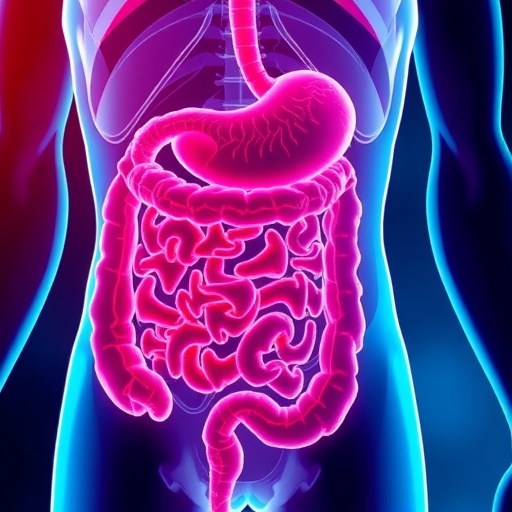In an unprecedented convergence of synthetic biology and cancer immunotherapy, scientists from the Yong Loo Lin School of Medicine at the National University of Singapore (NUS Medicine), in collaboration with researchers from Central South University in China, have engineered a pioneering bacterial strain designed to home in on the gut and trigger potent immune responses against colorectal cancer (CRC). This innovative approach targets one of the deadliest malignancies worldwide, promising a revolutionary shift in cancer treatment paradigms.
Colorectal cancer remains a formidable challenge, ranking as the second leading cause of cancer-related mortality globally and accounting for more than 9% of all cancer deaths. Traditional treatment modalities such as chemotherapy and radiation, though broadly used, often carry significant collateral damage, harming healthy tissue alongside malignant cells. Against this backdrop, immunotherapy emerges as a beacon of hope, leveraging the body’s immune system to identify and selectively attack cancer cells, thereby minimizing adverse effects and enhancing precision.
The fundamental principle behind this breakthrough lies in the body’s natural antitumour immune responses. These responses function as an intrinsic surveillance network capable of detecting aberrant cells, including tumorigenic ones, and mobilizing immune effectors to eradicate them. Unfortunately, many tumors develop sophisticated mechanisms to suppress or evade immune detection, creating immunosuppressive microenvironments that protect them from immune-mediated destruction. Overcoming this immunosuppressive barricade has been a central focus of recent oncology research.
To confront this challenge, the research team employed synthetic biology to genetically modify a strain of Salmonella typhimurium, a species of bacteria with an inherent ability to colonize tumors preferentially. This engineered microbe was designed not only to infiltrate cancerous tissue but to secrete a potent therapeutic agent known as LIGHT (a member of the tumor necrosis factor superfamily) directly within the tumor microenvironment. LIGHT plays a pivotal role in immune signaling by engaging specific pathways that incite local immune activation.
One of the most remarkable outcomes of this bacterial therapy is the induction of mature tertiary lymphoid structures (mTLSs) within tumor sites. These ectopic lymphoid aggregates resemble lymph nodes and act as critical hubs for coordinating antitumour immune activity, facilitating the local activation and proliferation of T cells and innate lymphoid cells. The formation of mTLSs has been correlated with enhanced patient survival and improved responsiveness to treatment across various cancers, particularly colorectal cancer.
Professor Shawn Chen Xiaoyuan from NUS Medicine emphasized the significance of activating the LIGHT-HVEM signaling axis. This molecular interaction triggers group 3 innate lymphoid cells (ILC3s), which are instrumental in orchestrating the T cell–mediated immune assaults that form the cornerstone of effective antitumour immunity. By harnessing this pathway, the engineered Salmonella strain effectively reprograms the tumor milieu from an immunosuppressive state into one that favors immune infiltration and destruction of cancer cells.
Beyond immune activation, the bacterial therapy demonstrated an impressive safety and biocompatibility profile in rigorous laboratory models. It not only suppressed tumor growth and prolonged survival but also contributed to restoring the balance of healthy gut microbiota—an essential factor considering the microbiome’s critical role in modulating systemic immunity and overall health. Importantly, no off-target bacterial accumulation was observed in non-tumor tissues or organs, underscoring its targeted mode of action and safety potential.
The therapeutic implications of this work extend far beyond CRC. By establishing proof-of-concept for programmable “living medicines,” this approach paves the way for a new generation of treatments that can be dynamically engineered to interact with and reshape complex biological environments from within. The capacity to customize such bacterial agents offers the tantalizing possibility of tailored therapies that respond to individual tumor characteristics and patient-specific immune landscapes.
Co-lead author Professor Pengfei Rong of Central South University highlighted the transformative potential of these programmable biological systems. This methodology represents a shift toward in situ tumor modulation, where the pathogen is not simply a delivery vehicle but an active participant in manipulating immune architecture and function, thereby amplifying therapeutic efficacy with precision that surpasses current modalities.
Looking forward, the research team is undertaking comprehensive preclinical evaluations aimed at validating the safety and effectiveness of this synthetic biotic platform in preparation for human clinical trials. These steps are crucial for translating laboratory success into clinical realities, addressing regulatory considerations, and ensuring that these living therapeutics fulfill their promise in treating CRC patients resistant to existing treatments.
The convergence of synthetic biology, microbiology, and immuno-oncology in this work epitomizes the future of cancer therapy—complex yet elegantly orchestrated interventions that harness nature’s own tools to reawaken and empower the immune system. Should clinical translation prove successful, this technology could radically alter the landscape of colorectal cancer management, offering hope where few options currently exist.
This groundbreaking research underscores the imperative to continue exploring microbiome-based therapies and immune microenvironment modulation as central strategies for combating cancer. The meticulous engineering of gut-colonizing bacteria to act as immune enhancers marks a decisive advancement—one that brings personalized, less toxic, and more effective cancer treatment closer to reality.
As the scientific community watches with anticipation, the implications of inducing mature TLS formation via synthetic biotics resonate far beyond colorectal cancer, potentially opening horizons for diverse applications across cancer types and other diseases where immune modulation is pivotal.
Subject of Research: Synthetic biology-based induction of mature tertiary lymphoid structures (mTLSs) to enhance antitumor immunity in colorectal cancer.
Article Title: Synthetic biology–driven induction of mature TLS formation enhances antitumor immunity in colorectal cancer
News Publication Date: 18-Jun-2025
Web References:
https://www.science.org/doi/10.1126/scitranslmed.ado8395
http://dx.doi.org/10.1126/scitranslmed.ado8395
References:
Bray F, Laversanne M, Sung H, et al. Global cancer statistics 2022: GLOBOCAN estimates of incidence and mortality worldwide for 36 cancers in 185 countries. CA Cancer J Clin. 2024;74(3):229‐263. doi:10.3322/caac.21834
Keywords:
Nanomedicine, Colorectal cancer, Cancer, Tumor cells, Gut microbiota, Microbiota




